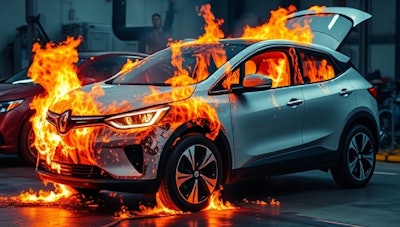
Toronto, Ontario -- The number of fires caused by lithium-ion batteries has increased dramatically in the past two years, according to a new report from global insurer QBE.
The report, which was based on figures from the U.K., found that between 2022 and 2024, the number of fires involving EV batteries rose by 77 percent, while the number of electric vehicles on the road have more than doubled in the same period, the risk from EV fires is substantial due to their fire intensity and speed of ignition and spreading caused by lithium-ion batteries.
“Lithium-ion battery fires continue increasing at a worrying pace," says Adrian Simmonds, practice leader for property risk solutions at QBE, adding that battery fires require about ten times as much water to douse as other fires. "People need to understand the risks and how to deal with them."
QBE is calling for improvements to lithium-ion battery safety as the fires burn hotter, faster and behave more unpredictably than ordinary combustion fires, increasing the risk of injury to people and damage to property. In addition, many people still do not know how to manage these emerging technologies and devices safely in their homes or businesses.
The ubiquity of smaller electric vehicles is also increasing the risk of conflagrations. Fires involving electric scooters increased by 32 percent from 118 in 2022 to 156 in 2024. Fires involving electric mobility scooters rose by 20 percent from 25 in 2022 to 30 in 2024. These incidents are attributed largely to overcharging, damage, or the use of incompatible chargers, all of which can lead to overheating and combustion.
QBE also provided 10 recommendations to businesses that handle lithium-ion batteries:
- Purchase only certified devices from trusted suppliers.
- Inspect batteries regularly for signs of damage and dispose of compromised units through certified professionals.
- Store batteries in non-combustible, ventilated areas with proper separation.
- Charge batteries only during business hours using approved chargers.
- Keep ignition sources away from charging or recently used batteries.
- Avoid exposing batteries to extreme heat, cold, or moisture and don’t place heavy items on them.
- Evacuate and call emergency services if overheating or fire occurs — don't use fire extinguishers.
- Use infrared thermography to monitor temperature spikes as an early warning.
- Develop and implement an emergency response plan with full staff training.
- Recycle batteries at certified centres — never open, burn or destroy them.



















